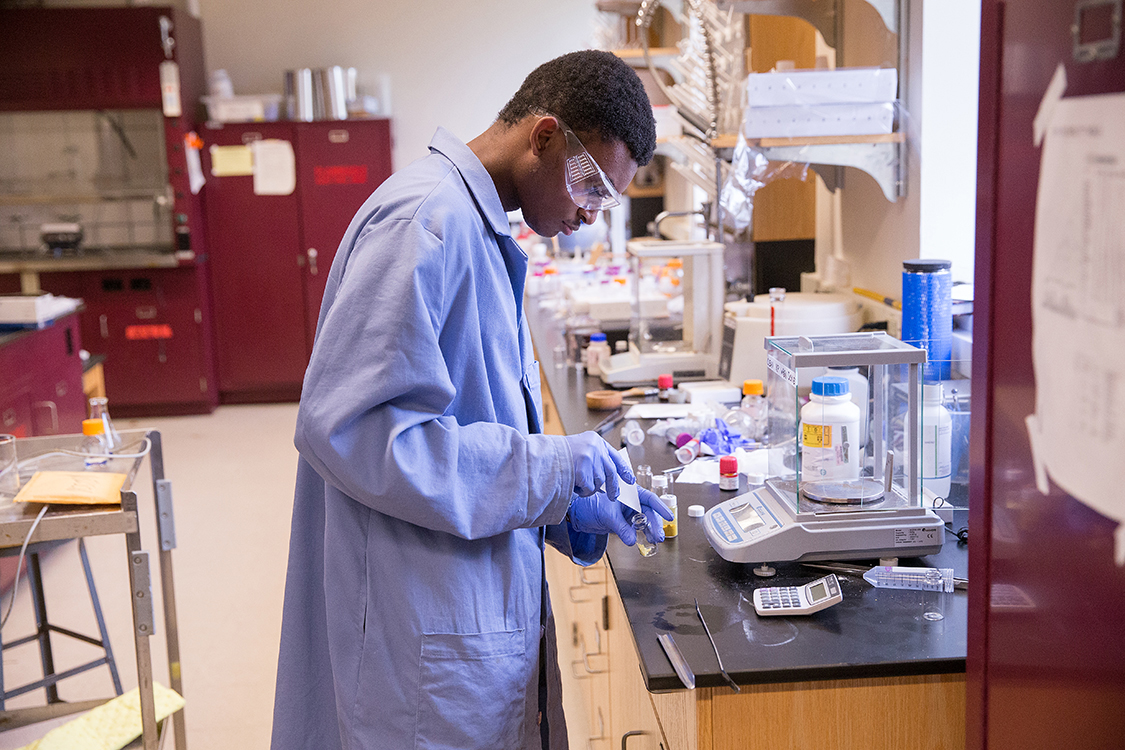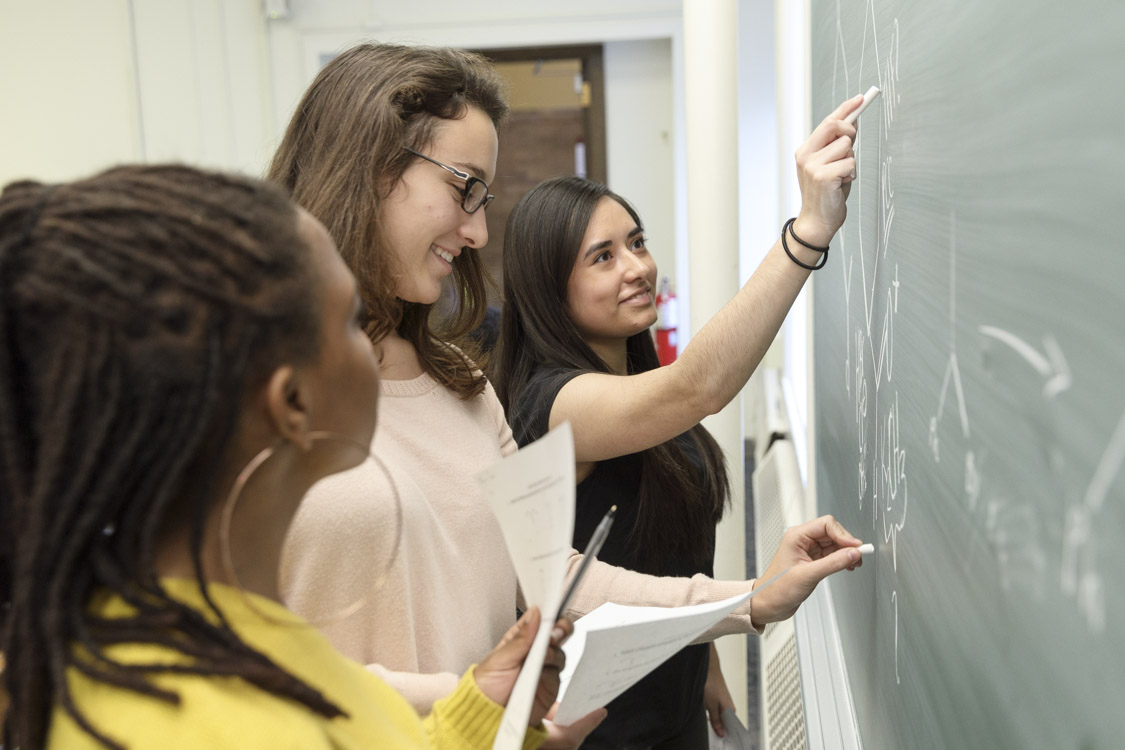Biology scholars diversify grad-school landscape
By Kathy Hovis

Coming to Cornell from an Oklahoma high school with limited resources and a significant dropout rate, Emily Frech ’17 was a little intimidated sitting next to fellow Cornell freshmen biology majors, some of whom went to elite high schools catering to pre-med students.
While Frech was on top of her game academically, “I felt I didn’t quite belong here,” she said.
At the beginning of her freshman year, she applied to the Office of Undergraduate Biology’s Biology Scholars Program (BSP), which offers mentoring, study groups and guidance to biology majors from underrepresented groups.
Frech said the program helped her deal with an occasional B and C, grades she hadn’t received in high school.
“I learned that here you are a small fish in a big pond,” she said. She also learned to balance her work with other activities; for her, it's the Big Red Marching Band, where she leads the drumline. And BSP connected her to faculty in her interest area of human nutrition, enabling her to join a lab freshman year.
BSP, which started in 2006, accepts about 35 freshmen each year. Of the 120 biology scholar graduates from 2010 to 2016, 91 percent of those who applied to medical school have been admitted, 19 are in Ph.D. programs and three are enrolled in M.D./Ph.D. programs.
“The success of the Biology Scholars Program stems largely from the hard work and dedication of the students themselves,” said Jeff McCaffrey, assistant director of advising in the Office of Undergraduate Biology and coordinator of the program. “BSP provides a framework within which members can improve and excel academically, contribute to the success and well-being of their peers, and become engaged in their scientific community. We also have biology faculty who volunteer each semester to share their expertise, career stories and time to help biology scholars understand the nuances of scientific research.”
The program helps tackle the lack of diversity in medical schools, graduate programs and other fields in biology. This lack of diversity affects not only the way research dollars are spent but leads to disparate care for patients, McCaffrey said.

While underrepresented minorities comprise 13 percent of the U.S. population, just 4 percent of the physician workforce and only 5.3 percent of U.S. medical school faculty are underrepresented minorities, a figure that has changed little over the past decade, according to the Association of American Medical Colleges (AAMC).
Along with racial and ethnic diversity, there’s also a lack of socioeconomic diversity among students in U.S. medical schools, with the AAMC reporting that entering medical students from the lowest income quintile have never been greater than 5.5 percent of the total of new students.
Cornell students can apply to BSP during the first semester of their freshman year. Scholars are assigned to weekly study groups and start to coalesce as a unit during an outing at the Hoffman Challenge Course. They also take two one-credit seminars freshman and sophomore year, where they talk about everything from connecting with professors to finding a research lab to exploring career options.
They also are invited to a series of special events – faculty dinners, social outings, alumni networking events, site visits to medical/graduate schools and guest speakers.
“Through BSP, I’ve developed some of my closest friends,” said Jessica Nino de Rivera ’17, a biological sciences major who wants to combine her interests in medicine and health care policy. “The program has done so much for me. As a first-generation student, I want to help others who are coming from similar backgrounds.”
Nino de Rivera has been a study group leader for general and organic chemistry courses. “I tell freshmen not to be scared, that if they put in the effort and ask questions when they need help, they will be OK,” she said.
Biology scholars quickly develop a sense of belonging at Cornell, which has a positive impact on their academic success and social adjustment.
“BSP helped me to realize the importance of working in groups,” said Daniel Veronese ’17, a biological sciences major with a concentration in ecology and evolutionary biology.
Veronese, who moved to the U.S. from Venezuela when he was 11, knew he wanted to study biology but thought his only career choices were in medicine until he was selected as one of 12 biology scholars to take part in the Galapagos curriculum. That curriculum is a set of linked courses in the spring of freshman year – an intensive version of Introductory Evolutionary Biology (sciences), a thematic freshman writing seminar (humanities) and a scientific illustration seminar (arts). The curriculum includes an expenses-paid trip to the Galapagos archipelago over spring break, led by Irby Lovette, the Fuller Professor of Ornithology and associate director for academic affairs at the Cornell Lab of Ornithology.
Veronese said that experience opened his mind to field work with animals and careers in research. The following summer, he did field work in Australia and was amazed “that I could have a career in something that I loved to do every day.”
Hendryck Gellineau ’19 also connected with research early on in his Cornell career, helping him to discover a love of chemistry (now his major).
After taking a chemistry class as a freshman and reading a story about copper and how it might be used in pharmaceuticals, Gellineau contacted Justin Wilson, a new Cornell chemistry faculty member studying metal complexes, who eventually invited Gellineau to join his lab.
“He had me doing a lot of different reactions as a freshman,’” he said, so Gellineau stayed on in the lab last summer as part of Cornell’s HHMI Accelerating Medical Progress through Scholarship program, while also taking an organic chemistry course.
Gellineau thinks he might want to get an M.D./Ph.D. focusing on organic chemistry and may get into drug development.
“I think where I can be helpful is behind the scenes,” he said, “getting doctors in the emergency rooms what they need to help patients.”
Kathy Hovis is a writer for the College of Arts and Sciences.
Media Contact
Get Cornell news delivered right to your inbox.
Subscribe